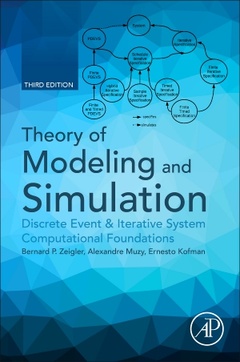Description
Theory of Modeling and Simulation (3rd Ed.)
Discrete Event & Iterative System Computational Foundations
Authors: Zeigler Bernard P., Muzy Alexandre, Kofman Ernesto
Language: English
Subject for Theory of Modeling and Simulation:
122.46 €
In Print (Delivery period: 14 days).
Add to cart692 p. · 19x23.3 cm · Paperback
Description
/li>Contents
/li>Readership
/li>Biography
/li>Comment
/li>
Theory of Modeling and Simulation: Discrete Event & Iterative System Computational Foundations, Third Edition, continues the legacy of this authoritative and complete theoretical work. It is ideal for graduate and PhD students and working engineers interested in posing and solving problems using the tools of logico-mathematical modeling and computer simulation. Continuing its emphasis on the integration of discrete event and continuous modeling approaches, the work focuses light on DEVS and its potential to support the co-existence and interoperation of multiple formalisms in model components.
New sections in this updated edition include discussions on important new extensions to theory, including chapter-length coverage of iterative system specification and DEVS and their fundamental importance, closure under coupling for iteratively specified systems, existence, uniqueness, non-deterministic conditions, and temporal progressiveness (legitimacy).
1. Introduction to Systems Modeling Concepts
2. Framework for Modeling and Simulation
3. Modeling Formalisms and Their Simulators
4. Introduction to DEVS
5. Hierarchy of System Specifications
6. Basic Formalisms: DEVS, DESS, DTSS
7. Basic Formalisms: Coupled MultiComponent Systems
8. Simulators for Basic Formalisms
9. Multi-Formalism Modeling and Simulation
Part II Iterative System Specification
10. Introduction to Iterative System Specification
11. Basic Iterative System Specification
12. Iterative Specification Subformalisms
13. Finite and Timed Iterative Specifications
Part III System Morphisms: Abstraction, Representation, Approximation
14. Parallel and Distributed Discrete Event Simulation
15. Abstraction: Constructing Model Families
16. Verification, Validation, Approximate Morphisms
17. DEVS and DEVS-like Systems
18. Quantization-Based Simulation
19. DEVS Representation of Iteratively Specified Systems
Part IV Enhanced DEVS Formalisms
20. DEVS Markov Modeling and Simulation
21. DEVS Markov Model Lumping
22. Spiking Neuron Modeling- Iterative Specification
23. Open Research Problems
Zeigler is currently heading a project for the Joint Interoperability Test Command (JITC) where he is leading the design of the future architecture for large distributed simulation events for the Joint Distributed Engineering Plant (JDEP). He is also developing DEVS-methodology approaches for testing mission thread end-to-end interoperability and combat effectiveness of Defense Department acquisitions and transitions to the Global Information Grid with its Service Oriented Architecture (GIG/SOA).
Alexandre MUZY is research fellow at CNRS, France, where he is in charge of the research group Modélisation, Simulation & Neurocognition (MS&N) at I3S laboratory in Sophia Antipolis.
Ernesto Kofman is a Professor at the Control Department at the Faculty of Exact Sciences, Engineering and Surveying of the National University of Rosario (FCEIA-UNR) and a Research Member of the National Research Council of Argentina (CONICET) , where he is in charge of the Simulation and Automatic Control Group of the French-Argentine International Center for Information and Systems Sciences (CIFASIS).
- Presents a 40% revised and expanded new edition of this classic book with many important post-2000 extensions to core theory
- Provides a streamlined introduction to Discrete Event System Specification (DEVS) formalism for modeling and simulation
- Packages all the "need-to-know" information on DEVS formalism in one place
- Expanded to include an online ancillary package, including numerous examples of theory and implementation in DEVS-based software, student solutions and instructors manual
These books may interest you

Model Engineering for Simulation 122.46 €



